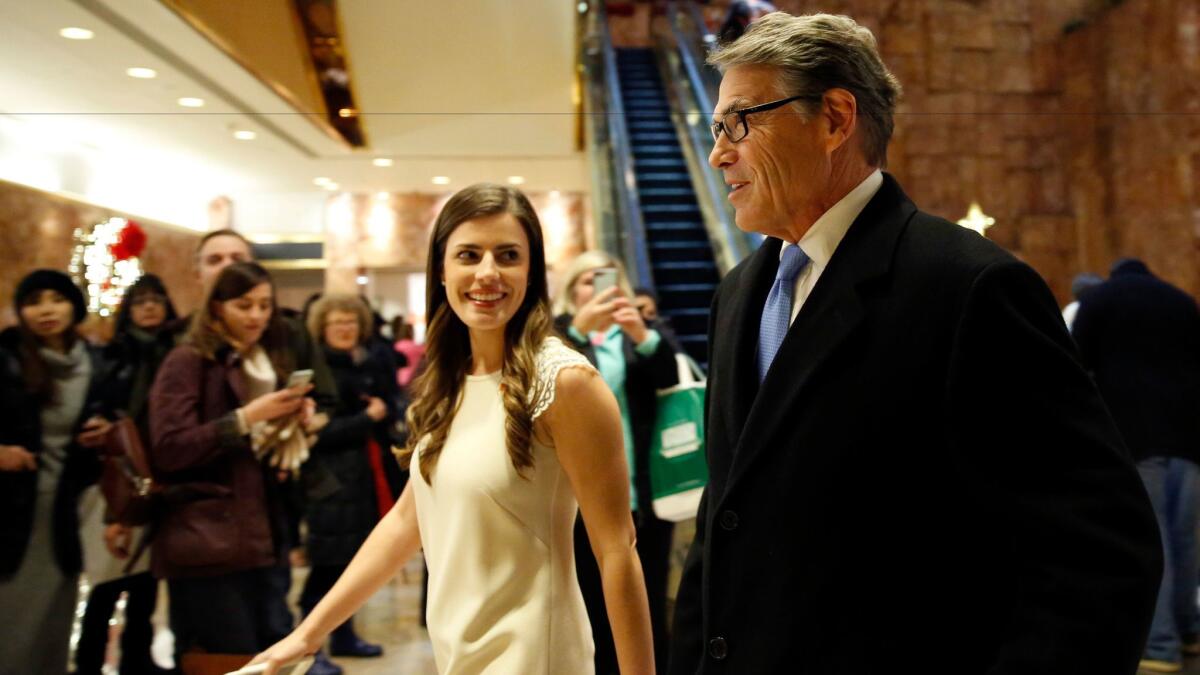Editorial: Trump’s team: Outsiders, maybe; populists, no

- Share via
With the official announcement that he will nominate Exxon Mobil Chief Executive Rex Tillerson as secretary of State — and reports that he will soon tap former Gov. Rick Perry of Texas as Energy secretary — Donald Trump has all but completed the assembly of his proposed Cabinet. “Proposed” is an important qualifier because several of those selections — including Tillerson — cry out for more than usual scrutiny by the Senate.
So how should we characterize the Trump team? The president-elect campaigned as a political outsider, and several of his Cabinet choices are faithful to that vision — if you consider Wall Street financiers, corporate executives, state government officials and military leaders to be outsiders simply because they’re not Washington bureaucrats or professional politicians. By that standard, Tillerson is an outsider even though he’s a fantastically wealthy corporate chieftain who has spent decades as a leader in the oil and gas industry. So is recently retired Marine Corps Gen. James Mattis, Trump’s unconventional choice to serve in the civilian position of secretary of Defense.
Almost every one of Trump’s picks will head a department that he or she has sued, fought or sought to undermine.
But Trump sounded populist, anti-Wall Street themes during the campaign, and in that sense these appointments break faith with his rhetoric. For example, Trump savaged Sen. Ted Cruz and Hillary Clinton for connections to Goldman Sachs; yet his choice for secretary of the Treasury, Steven Mnuchin, is an alumnus of the much-demonized investment banking firm (as is his top economic advisor).
Trump nominees are worrisomely extreme in some cases, but much of the governing philosophy of the new administration seems likely to be consistent with that of conservative House Republicans, particularly on domestic issues, and with the sort of policies that would have been promoted by some of Trump’s rivals in the Republican primaries had they been nominated and elected. That doesn’t make their stances on the environment, healthcare, civil rights and tax policy any less noxious; it just means they’re familiar.
Although this page didn’t support Trump (to put it mildly), he is, like any president, entitled to deference from the Senate in forming his administration. But senators must also insist that Cabinet officials are qualified for their positions and that they will enforce laws passed by Congress. Some of Trump’s nominations raise one or both of those concerns.
The qualifications issue is especially acute with Tillerson. As Trump prepares to take office, both the international order established after World War II and the adjustment of those arrangements after the Cold War are under strain. The Middle East is still coping with the after-effects of the war in Iraq and the Arab Spring. China is flexing its military muscle.
Yet a new president with no experience in foreign policy — or in government service of any kind — has tapped as chief foreign policy advisor a businessman whose resume is similarly bereft of such credentials. Tillerson does have experience in negotiating complex business deals, including in Russia. But even if those skills are transferable to political diplomacy, he would face a dizzyingly steep learning curve.
(The Senate also needs to press Tillerson about whether his business contacts with Russia might influence the advice he would give about matters such as the continuation of economic sanctions imposed on Moscow for its interference in Ukraine. The fact that Tillerson did business with Russia — and even formed a friendship with Vladimir Putin — isn’t automatically disqualifying, but it should set the stage for rigorous confirmation hearings.)
With other nominees, the questions involve their commitment to enforce laws that they — and their president — may not agree with. Almost every one of Trump’s picks will head a department that he or she has sued, fought or sought to undermine. A good example is Perry, who pledged as a presidential candidate in 2008 to eliminate the department he has reportedly been picked to lead. If the Senate concludes that one or more of them aren’t committed to the basic mission Congress entrusted to the agencies they seek to head, it should reject them and require Trump to submit other candidates.
Insiders or outsiders, Trump’s Cabinet nominees will change the way Washington works and in many cases upend policies passionately pursued by the Obama administration. That they will be doing so at the direction of a candidate who lost the popular vote will add to the indignation of many Americans who didn’t support his candidacy. Having won the presidency, Trump has the right to his team, but the Senate has a duty to ensure that his choices are up to the tasks they face — and that they can be trusted to carry them out.
Follow the Opinion section on Twitter @latimesopinion and Facebook
More to Read
A cure for the common opinion
Get thought-provoking perspectives with our weekly newsletter.
You may occasionally receive promotional content from the Los Angeles Times.










